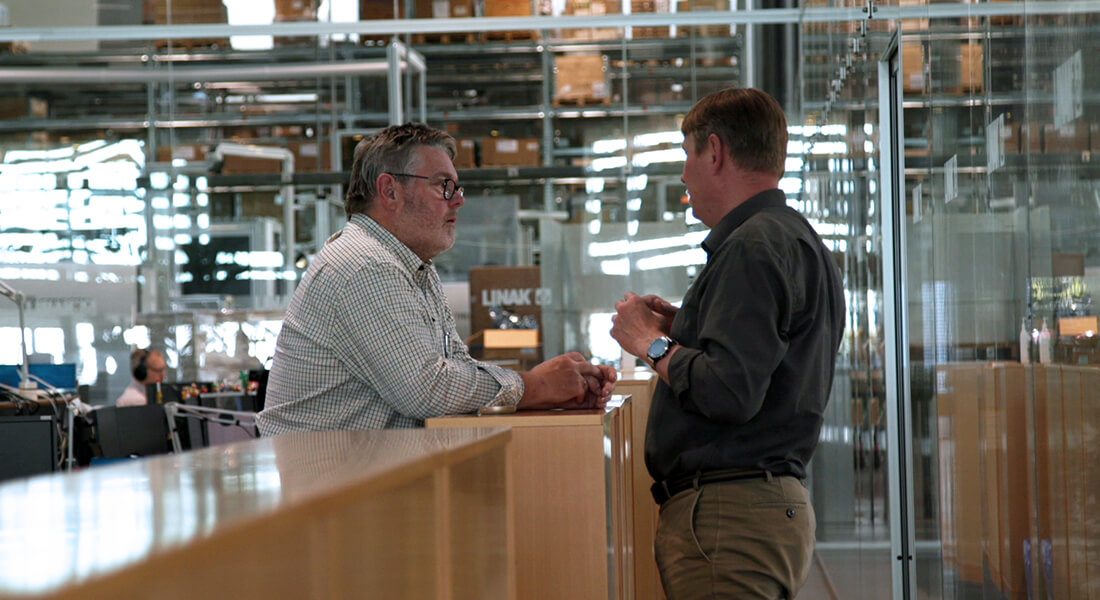Hearing loss: New film shows ways to a good school and working life
A new film from the Good Social Spaces and Places research project shows that it is possible to overcome some of the social challenges that people with hearing loss face at school or at work. In the film we meet Frida, who is now doing much better at school, and Leo, who has given up the idea of early retirement.

Living with hearing loss can lead to isolation, loneliness and depression. It's an underlying risk for around 800,000 Danes with hearing impairment.
But it's also possible to live a good life with hearing loss and to participate in both formal and informal communities, whether at work, school or elsewhere.
With the film we want to show that the world can indeed be made more inclusive for people with hearing loss.
This is the message of a new film from the research project Good Social Spaces and Places, which researchers from the Department of Sociology are conducting in collaboration with external partners (see box).
The project explores the barriers that people with hearing loss face in everyday life, but also how it is possible to create inclusive communities where people with hearing loss feel at home. The film named ‘Hvordan hører vi sammen? (How do we connect to each other?) focuses on the latter, as Frida and Leo share how, with fitting support, their everyday lives at school and work have become much better.
For PI Inge Kryger Pedersen, Associate Professor at the Department of Sociology, it was important to communicate the project's key findings in a way that would appeal not only to people with hearing loss, but to everyone. This is because, despite increasingly advanced technological solutions, technology cannot solve all the social challenges associated with hearing loss.
“’The world is not built for people with hearing loss', as one of the interviewees in our project put it. With the film we want to show that the world can indeed be made more inclusive for people with hearing loss. But it requires that we listen to each other and that we improve the social contexts in which people with hearing loss live," she says.
Back to the community
The two main characters in the film, student Frida Høgh Nielsen and project manager Leo Bram, aged 17 and 64 respectively, show that this is possible in practice.
I have become Frida instead of the one with the hearing aids.
Despite the age difference, both have experienced feeling disconnected. Frida in primary school, where she felt different and marginalised. Leo as a project manager at LINAK in Als, where a worsening hearing loss made him consider early retirement.
But a stay at Frijsenborg Efterskole (a boarding school), where one in four pupils has a hearing loss, and a course at Castberggård for employees with hearing loss reconnected them to a school and working community. Not least thanks to good support from those around them.
"I have become Frida instead of the one with the hearing aids," as Frida Høgh Nielsen describes it in the film.
The simple solutions
According to Inge Kryger Pedersen, it is often small, practical - almost banal - solutions that help to include people with hearing loss into the community: For instance, setting up school and meeting tables in a horseshoe shape and avoiding backlighting so that the person with hearing loss can see everyone who is speaking. Or avoiding talking over each other and perhaps using table microphones connected to a hearing aid.
Or it could be a solution like Frijsenborg Efterskole's special 'immersion hour', where all students have an hour to themselves. Such a break helps not only the pupils with hearing loss, who spend extra energy following conversations, but also all the other pupils. And because the 'recess' is for everyone, no one is singled out and no one misses out.
"It is a win-win solution, because many young people can be afraid of missing out. Young people with hearing loss experience this to an extreme degree and therefore help to highlight some of the more general problems we see in social contexts today," says Inge Kryger Pedersen.
She hopes that the project will not only create new knowledge, but also make visible the knowledge that already exists among hearing care professionals and others in the community.
"What creates good and bad emotional energy in people with hearing loss? What gives you high status in a group, even if you have hearing loss? What can others in the group do? Ultimately, it's about being considerate of each other and remembering to act on the good solutions.
The project behind the film will continue until autumn 2025 and also involves postdoctoral researcher Kim Sune Karrasch Jepsen and PhD student Ida Friis Thing from the Department of Sociology. In addition to the new film, the results will be disseminated as articles for scientific journals, but also in the form of a report and at a major Danish conference for practitioners in autumn 2024.
'Hvordan hører vi sammen?' with Leo and Frida's stories (in Danish only)
Contact
Inge Kryger Pedersen
Associate Professor, Department of Sociology
Email: ikp@soc.ku.dk
Telephone: +45 35 32 32 29
Søren Bang
Journalist, Faculty of Social Sciences
Email: sba@samf.ku.dk
Mobile: +45 29 21 09 73
